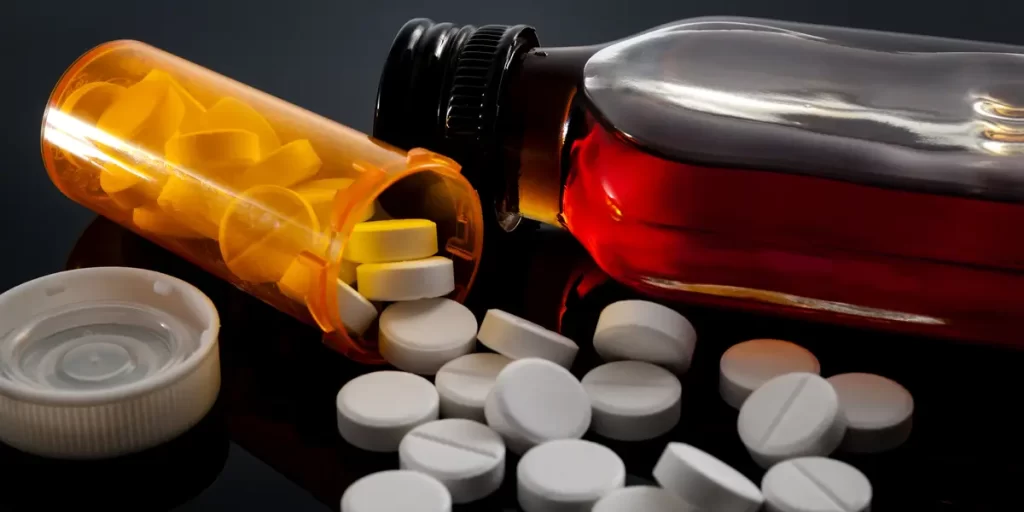Mixing Oxycodone and Alcohol – Know the risks
Written by Dr. Trisha Sippel, PhD
& Medically Reviewed by Thomas Christiansen
Medically Reviewed
Up to Date
Last Updated - 6/17/2022
View our editorial policy
Oxycodone is a prescription medication used to treat moderate or severe pain. Mixing alcohol with oxycodone can be very dangerous. Whether using oxycodone according to a prescription or recreationally, mixing oxycodone with alcohol is more dangerous than some people realize.
Why Do People Mix Oxycodone with Alcohol?
People taking oxycodone as pain medication may mix oxycodone with alcohol, not realizing the harmful effects that doing so can have. Even though oxycodone has a relatively short half-life, if a person is taking oxycodone as a pain medication, they should avoid drinking alcohol. It is always a good idea for individuals to speak with their doctor about the drug they are prescribed and what interactions it may have with other drugs or substances.
Others may mix oxycodone and alcohol to get high. Oxycodone is sometimes misused due to its effects on the brain and the euphoric feeling that a person can get from it. When a person uses oxycodone for this effect, they may become tolerant to the drug. If tolerance develops, they may need to take larger doses of oxycodone to feel the desired euphoria. Some people may try combining oxycodone with other substances to enhance their high. Alcohol is often used in combination with oxycodone for that reason.
Error: Contact form not found.
Oxycodone and Alcohol Use Statistics
Oxycodone is an opioid pain reliever that is frequently misused in the United States. Opioids, including oxycodone, were misused by 2.8% of the population in 2018. Alcohol use is reported even more often, with 65.5% of the population using alcohol in the year before the survey.
Combining alcohol use with oxycodone is not uncommon among those who use opioids. More than half of the people who misuse prescription opioids also binge drink. Binge drinking is defined as drinking four or more drinks for women and five or more drinks for men. People who binge drink are nearly two times more likely to misuse opioids compared to people who don’t drink. In 2010, the Centers for Disease Control and Prevention reported that 18.5% of opioid-related emergency department visits and 22.1% of opioid-related deaths in the United States involved alcohol.
Effects of Combining Alcohol with Oxycodone
What happens when you mix alcohol and oxycodone? Opioids and alcohol interact with each other and have similar effects on the central nervous system (CNS). They suppress the function of the brain and spinal cord, which control normal functions of the body. Opioids do so by binding to opioid receptors in the CNS and inhibiting their action. Alcohol works by interacting with several different pathways in the central nervous system, ultimately resulting in their inhibition.
When the two are mixed together, oxycodone and alcohol have an additive effect. Mixing them can cause slowed breathing and a decreased heart rate. If severe enough, these effects can lead to death. The effects are more dangerous in elderly individuals.
The side effects of mixing oxycodone with alcohol are:
- Suppressed breathing
- Decreased or irregular heartbeat
- Nausea
- Vomiting
- Feeling dizzy or losing coordination
- Fainting
- Feeling confused
- Excessive drowsiness
- Coma
Risks of Mixing Oxycodone with Alcohol
Since oxycodone and alcohol suppress functions of the CNS, combining alcohol with oxycodone significantly increases the risk of overdosing. During an oxycodone and alcohol overdose, bodily functions shut down, which can lead to death. If you suspect that someone is overdosing on alcohol and opioids, get help immediately by calling 9-1-1 or your local emergency number.
Oxycodone is highly addictive and a person who misuses it has a risk of becoming dependent on oxycodone. When a person is dependent on a drug, they need it to feel normal and will use it despite the other negative consequences it may have on their life. A person who misuses one drug is more likely to try other drugs or use more than one drug at a time.
Treatment for Oxycodone and Alcohol Addiction
There are several treatment options for people who have oxycodone or alcohol use disorders. Oxycodone and alcohol addiction treatment will usually involve medical detox where a person is tapered off the substance use with the aid of medications to ease their withdrawal symptoms. The detox process will also include therapy and support for the person to help them stop their drug use.
Dual diagnosis treatment is for people who have co-occurring mental health and substance use disorders. This treatment method involves treating both disorders. After the person stops using oxycodone and alcohol, therapy continues to help the person abstain from using the substance and address the issues as to why they started using drugs to begin with.
Contact The Recovery Village Ridgefield to speak with a representative about how professional addiction treatment can address substance use disorders. Take the first step toward a healthier future, call today.
Sources
Food and Drug Administration. “Oxycodone Prescribing Information.” August 2018. Accessed August 30, 2109.
National Survey on Drug Use and Health. “2018 NSDUH Detailed Tables.” Substance Use and Mental Health Services Administration, 2018. Accessed August 29, 2019.
Center for Disease Control and Prevention. “More than Half of People who Misuse Prescription Opioids also Binge Drink.” June 10, 2019. Accessed August 29, 2019.
Jones, Christopher M.; Paulozzi, Leonard J.; Mack, Karin A. “Alcohol Involvement in Opioid Pain Reliever and Benzodiazepine Drug Abuse–Related Emergency Department Visits and Drug-Related Deaths — United States, 2010.” Centers for Disease Control and Prevention Mortality and Morbidity Weekly Report, October 10, 2014. Accessed August 30, 2019.
Trescot, Andrea M.; Datta, Sukdeb; Lee, Marion; Hansen, Hans. “Opioid Pharmacology.” Pain Physician, 2008. Accessed August 29, 2019.
Valenzuela, C. Fernando. “Alcohol and Neurotransmitter Interactions.” Alcohol Health and Research World, 1997. Accessed August 29, 2019.
Van der Schrier, Rutger; et al. “Influence of Ethanol on Oxycodone-induced Respiratory Depression: A Dose-escalating Study in Young and Elderly Individuals.” Anesthesiology, March 2017. Accessed August 29, 2019.
Witkiewitz, Katie; Vowles, Kevin E. “Alcohol and Opioid Use, Co-Use, and Chronic Pain in the Context of the Opioid Epidemic: A Critical Review.” Alcoholism, Clinical and Experimental Research, March 2018. Accessed August 29, 2019.
View Sources
Food and Drug Administration. “Oxycodone Prescribing Information.” August 2018. Accessed August 30, 2109.
National Survey on Drug Use and Health. “2018 NSDUH Detailed Tables.” Substance Use and Mental Health Services Administration, 2018. Accessed August 29, 2019.
Center for Disease Control and Prevention. “More than Half of People who Misuse Prescription Opioids also Binge Drink.” June 10, 2019. Accessed August 29, 2019.
Jones, Christopher M.; Paulozzi, Leonard J.; Mack, Karin A. “Alcohol Involvement in Opioid Pain Reliever and Benzodiazepine Drug Abuse–Related Emergency Department Visits and Drug-Related Deaths — United States, 2010.” Centers for Disease Control and Prevention Mortality and Morbidity Weekly Report, October 10, 2014. Accessed August 30, 2019.
Trescot, Andrea M.; Datta, Sukdeb; Lee, Marion; Hansen, Hans. “Opioid Pharmacology.” Pain Physician, 2008. Accessed August 29, 2019.
Valenzuela, C. Fernando. “Alcohol and Neurotransmitter Interactions.” Alcohol Health and Research World, 1997. Accessed August 29, 2019.
Van der Schrier, Rutger; et al. “Influence of Ethanol on Oxycodone-induced Respiratory Depression: A Dose-escalating Study in Young and Elderly Individuals.” Anesthesiology, March 2017. Accessed August 29, 2019.
Witkiewitz, Katie; Vowles, Kevin E. “Alcohol and Opioid Use, Co-Use, and Chronic Pain in the Context of the Opioid Epidemic: A Critical Review.” Alcoholism, Clinical and Experimental Research, March 2018. Accessed August 29, 2019.
Authorship






